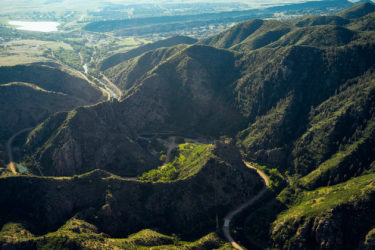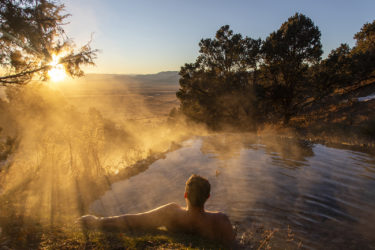The Local newsletter is your free, daily guide to life in Colorado. For locals, by locals.
About 240 years ago, as white settlers started making their way west, the federal government began divvying up vast swaths of territory into 640-acre squares, some of which it gave to the newly formed states to fund schools and, later, to the railroads to spur industrialization. Others it sold to private owners. Millions of acres never found buyers, however, and agencies such as the Bureau of Land Management stepped in to administer the terrain. Today, much of it is open for hunting, fishing, and exploration, but there are thousands of public parcels that recreationists have no way to access.
That’s because they’re corner-locked, meaning they’re surrounded by a checkerboard of private property (think: farms and ranches) and only touch other squares of government land at their corners. Until recently, finding the exact points where those federally owned tracts meet was practically impossible; paper maps were too imprecise. Then came GPS. Smartphone in hand, it’s now feasible to step from one corner of public property to another, seemingly opening up what GPS mapping company OnX estimates is 8.3 million acres of corner-locked land in the West, including 101,100 acres in Colorado.
But so-called corner crossings have led recreationists into a legal gray area, says Joel Webster, vice president of Western conservation at the Washington, D.C.–based Theodore Roosevelt Conservation Partnership, because even when done correctly (meaning private property is never touched) it’s unclear if the act is lawful: Land ownership doesn’t stop at the ground, and it’s impossible to cut corners without passing through someone else’s airspace. Whether or not that amounts to trespassing is another issue, and many Colorado prosecutors have declined to press charges when it’s happened.
That ambiguity could soon disappear. In 2021, four hunters in Carbon County, Wyoming, used a ladder to corner cross over a fence and were later charged with trespassing. Although a jury found the defendants not guilty, a related civil suit, in which the rancher in question is suing the hunters for millions of dollars for decreasing his property value, could set a precedent at the federal level. The case will likely take years to reach a final judgment.
In the meantime, freshman state Representative Brandi Bradley of Douglas County sponsored a bill earlier this year to create a task force to study the issue and submit recommendations to the state Legislature in November. If the bill passes—and the Legislature adopts those recommendations, whatever they are—Colorado would become the first state to clarify the maneuver’s legal status, one way or the other. (At press time, the bill was still under consideration.)
Bradley hopes this will eventually lead to the legalization of corner crossing, but at the same time, she doesn’t want to harm property owners. In fact, by defining what corner crossing is, she believes it will be easier to punish those who fail to do it properly. “[As it stands now,] I can’t imagine sitting on a jury and saying, You know what, we’re gonna [convict] you because you breathed the air,” she says. “I mean, if that’s where we’re going in this world, then Lord help us.”









